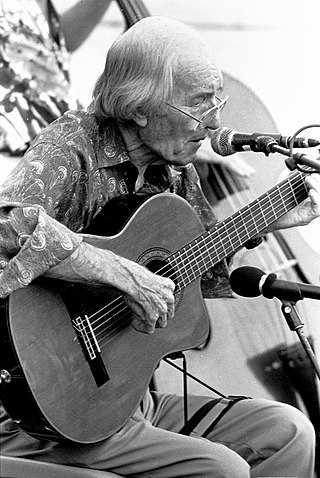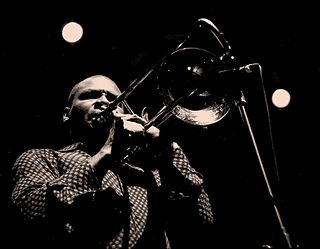Related Research Articles
Maryland is a U.S. state with a musical heritage that dates back to the Native Americans of the region and includes contributions to colonial era music, modern American popular and folk music. The music of Maryland includes a number of popular musicians, folk styles and a documented music history that dates to the colonial archives on music from Annapolis, an important source in research on colonial music. Famous modern musicians from Maryland range from jazz singer Billie Holiday to pop punk band Good Charlotte, and include a wide array of popular styles.

The Canadian Brass is a Canadian brass quintet formed in 1970 in Toronto, Ontario, by Charles Daellenbach (tuba) and Gene Watts (trombone), with horn player Graeme Page and trumpeters Stuart Laughton and Bill Phillips completing the quintet. As of August 2023, Daellenbach is the sole original member in the group, with the other members being trumpeters Joe Burgstaller and Mikio Sasaki, hornist Jeff Nelsen, and trombonist Keith Dyrda.

A brass quintet is a five-piece musical ensemble composed of brass instruments. The instrumentation for a brass quintet typically includes two trumpets or cornets, one French horn, one trombone or euphonium/baritone horn, and one tuba or bass trombone.The two instrumentations of the brass quintet that are currently in use are the quintet of two trumpets, horn, trombone, and tuba; and the quintet of two trumpets, horn, trombone, and bass trombone"(Lindhaul 1988). Musicians in a brass quintet may often play multiple instruments. Trumpet players for instance may double on piccolo trumpets and flugelhorns. There can be variation in instrumentation depending on the type of quintet. In some quintets, the horn is replaced by an additional trombone. Euphonium may also be substituted for the trombone part. While the tuba is considered a standard, the range and style of many pieces lend themselves to being played with bass trombone as the lowest-pitched instrument. Additionally, some pieces call for the use of percussion instruments, particularly the snare drum, tambourine, or timpani.
David Hickman is an American trumpeter, author, academic, and is widely considered one of the preeminent trumpet virtuosi of the 20th century. He is a Regents' Professor of trumpet at Arizona State University and past President of the International Trumpet Guild.

Charlie Lee Byrd was an American jazz guitarist. Byrd was best known for his association with Brazilian music, especially bossa nova. In 1962, he collaborated with Stan Getz on the album Jazz Samba, a recording which brought bossa nova into the mainstream of North American music.
Victor Vladimirovich Ewald, was a Russian engineer, architect, and composer of music, mainly for conical brass instruments.

Robin Eubanks is an American jazz and jazz fusion slide trombonist, the brother of guitarist Kevin Eubanks and trumpeter Duane Eubanks. Younger brother Shane Eubanks, twin to Duane Eubanks, is a DJ. His uncles are jazz pianist Ray Bryant and bassist Tommy Bryant. His mother, Vera Eubanks, was famed pianist Kenny Barron's first piano teacher.
The music of Annapolis, Maryland, played a major role in the music history of the United States during the colonial era and has since produced a number of notable musical institutions and groups.
John Marcellus was a trombone musician and teacher. He was Professor of Trombone at the Eastman School of Music of the University of Rochester and Chair of the Woodwind, Brass, and Percussion Department. In addition to his trombone teaching responsibilities at Eastman, Marcellus was the conductor of the Eastman Trombone Choir, Eastman Bionic Bones, and the trombonist with the Eastman Brass. Marcellus joined the faculty of the Eastman School in 1978, and was named the Kilbourn Professor from 1982 to 1983. He succeeded the trombonist and teacher Emory Remington, who served as Professor of Trombone at Eastman close to 50 years. Marcellus retired in 2014 after 36 years at Eastman.

William Edward Childs is an American composer, jazz pianist, arranger and conductor from Los Angeles, California, United States.
David C. Sampson is an American contemporary classical composer.
Chuck Redd is an American jazz drummer and vibraphonist.
The Georgia Brass Band was conceived by co-founders Joe Johnson and Christopher Priest in the spring of 1999. It is a traditional British brass band. The band performed its first concert in September of that year and has maintained a very busy schedule ever since. Band members are selected by audition or invitation and include some of the finest musicians in the Atlanta area.

The Bob Cole Conservatory of Music is the school of music at California State University, Long Beach. In March 2008, the music department was renamed the Bob Cole Conservatory of Music in honor of an endowment gift of $16.4 million from the estate of Robert "Bob" Cole. Cole, a Long Beach real estate investor, long-time music lover, and amateur pianist, died in 2004. Following its disbursement, the gift will benefit the students of the conservatory in the form of scholarships and other awards.
David Jason Snow is an American composer. Snow studied composition with Samuel Adler, Warren Benson, and Joseph Schwantner at the Eastman School of Music, Jacob Druckman at the Yale School of Music, and Arthur Berger and Martin Boykan at Brandeis University. At the Eastman School, Snow was awarded the Sernoffsky, McCurdy, and Howard Hanson prizes in composition; Yale awarded him a Bradley-Keeler Memorial Scholarship and the Frances E. Osborne Kellogg Prize in composition. Snow has been the recipient of awards, fellowships, residencies and commissions from BMI, the National Association of Composers/USA, the National Federation of Music Clubs, the Annapolis Fine Arts Foundation, the ASCAP Foundation, the College Band Directors Association, the National Endowment for the Arts, Res Musica Baltimore, the Maryland State Arts Council, the Renée B. Fisher Foundation, Trio Indiana, SoundMoves, Pastiche, the Arts Council of Montgomery County (Maryland), Yaddo, and the Millay Colony for the Arts.
Robert Charles Suderburg was an American composer, conductor, and pianist.
Philip Jameson graduated from Wooster High School in 1959 and attended Baldwin Wallace College for one year.
The Jazz Mafia is a young American musical collective led by Adam Theis and performs music rooted in jazz but touching on other genres and featuring a variety of sub-groupings with various collaborators.

William Frederick Mills was a Canadian trumpeter and educator best known for his work with the Canadian Brass quintet from 1972 to 1996. He also served as a professor for the University of Georgia from 1996 until 2009.
Steven (Steve) Novosel is an American jazz double bassist and educator whose 40-plus year career has spanned numerous genre, from traditional jazz to swing, bebop, mainstream and avant garde.
References
- 1 2 3 4 5 Smith, Linell (12 August 1976). "Annapolis Brass Quintet is both orthodox, unorthodox". The Evening Sun Baltimore. Baltimore, Maryland. p. 62. Retrieved 1 August 2020.
- 1 2 3 "Annapolis Brass, Charlie Byrd will appear this week". The Daily Times. Salisbury, Maryland. 28 April 1985. p. 48. Retrieved 1 August 2020.
- ↑ Greenfield, Phil (23 April 1993). "Brass quintet to trumpet its finale this weekend". The Baltimore Sun. p. 27. Retrieved 1 August 2020.
- ↑ Duncan, Scott (5 June 1986). "Big bold brassy". The Evening Sun. Baltimore, Maryland. p. 21. Retrieved 1 August 2020.
- ↑ Scarupa, Henry (16 June 1989). "East, West Berlin to meet at brass quintet festival". The Baltimore Sun. Baltimore, Maryland. p. 93. Retrieved 1 August 2020.
- 1 2 "'Chamber Jazz'". The Daily Times. Salisbury, Maryland. 7 April 1989. p. 35. Retrieved 1 August 2020.